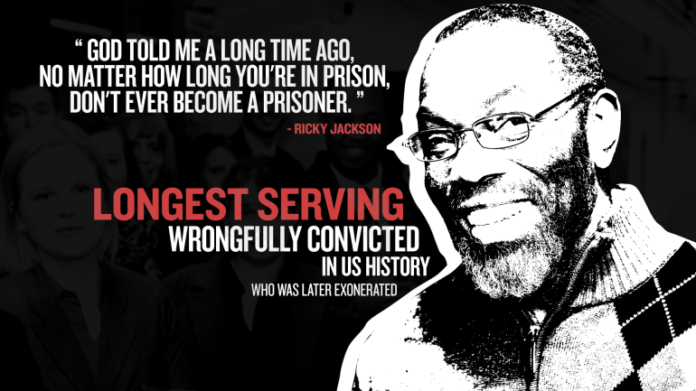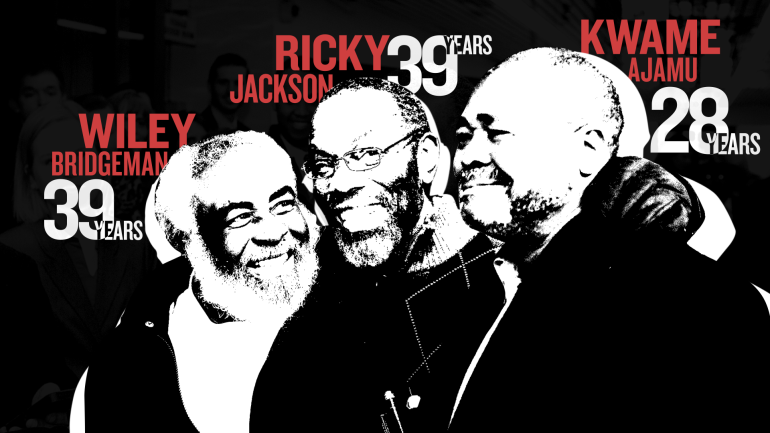
This is the most unfortunate incident of miscarriage of justice in the United States of America — the land of the free and the home of the brave.
Ricky Jackson, Wiley Bridgeman and his brother Ronnie Bridgeman were sentenced to death in 1975 for the murder of Harold Franks, a money order salesman in Cleveland, after a 12-year-old boy Eddie Vernon testified he saw the trio commit the crime. Their death sentences, however, were commuted to life in prison after the U.S. Supreme Court outlawed capital punishment in 1978.
All three were exonerated in November 2014, after Eddie recanted his testimony and told authorities in 2013 that he had implicated the trio because he had been pressured and threatened by the police to testify. Ricky was 18, Wiley was 20, and Ronnie (now known as Kwame Ajamu) was 17 at the time. They’re now 60, 62, and 59.
Even as Ricky was wrongfully deprived of his entire adult life, and his mother, father, stepfather and other relatives died while he endured physical and emotional assault in jail for 39 years, he had no malice against Eddie:
“Well, I guess a lot of people would want me to hate that person and carry animosity towards them but I don’t. People have to remember that they see him as a grown man today, but in ’75 he was a 12-year-old kid. And he was manipulated and coerced by the police, and they used him. They used him to get us in prison. So as far as that young man is concerned, I wish him the best. I don’t hate him. I just wish he has a good life.
“It took a lot of courage to do what he did in that courtroom. You don’t hear his testimony but it took a lot of courage to do what he did. They tried to break him. They tried to screw him up, but at the end, he always said the same basic thing, “They didn’t do it. I lied”. And that took a lot of courage for him. He’s been carrying a burden around for 39 years like we had, but in the end, he came through and I’m grateful for that.”
In March 2015, Ricky was awarded $2 million as compensation for spending 39 years behind bars — the longest time in prison for someone wrongly incarcerated in the United States — for a murder he did not commit. Ricky’s tax-free award was based on Ohio’s base rate for wrongful conviction compensation, which stands at $40,330 per year spent in jail, adjusted accordingly for inflation.
Even as Ricky’s award was a pittance — an Illinois man who spent nearly 20 years in jail after being wrongly imprisoned for rape and murder received a $20 million settlement — he was speechless, thankful, and called the compensation “fantastic,” which “was going to mean so much.” However, ”no matter the amount of money”, he told Fusion, ”we all have scars that we are never going to be able to recover from.”
In May 2015, Ricky filed a federal lawsuit against the city of Cleveland and eight officers, including detectives and their superiors for his arrest and wrongful incarceration. The lawsuit details how the officers coerced Eddie — who never saw the shooting — into implicating the three men; how they helped fabricate Eddie’s trial testimony and falsified investigative reports; how they ignored a suspect — who was convicted a few years later of multiple counts of armed robbery — implicated by informants and his own mother; and how Ricky was tortured in police custody after his arrest.
Even as his lawsuit seeks compensation for the grievous injustice, Ricky does not let his circumstances, however tragic, define who he is. Even as he will never forget the fact that he could not have kids, he does not feel bitter or spiteful.
“To be with these two guys is just phenomenal. Because this journey, our initial journey, stopped 39 years ago, involving this community here, this street, that store, that bus stop, and we got sidetracked into something we didn’t foresee. And to be standing right here today, you know, a little bit older, a little bit grayer, but nonetheless here, is just life affirming for me. I’m happy. I’m happy we all made it.”
This article (The Tragically Heartbreaking Story of America’s Longest-Held Innocent Prisoner) is a free and open source. You have permission to republish this article under a Creative Commons license with attribution to the author and AnonHQ.com.






